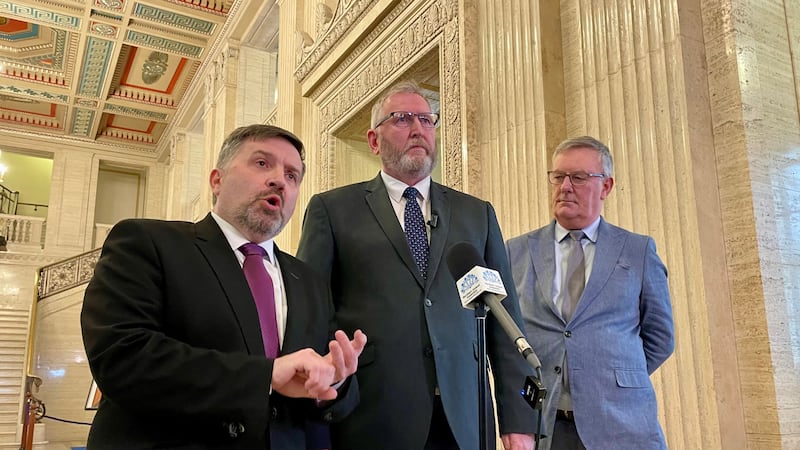WE were chatting after a Tyrone club championship game a few years ago.
A wise old farmer – the sort who could see around corners - chirped in: “You don’t fatten the sow on the way to the mart.”
He meant that the losers hadn’t prepared properly; they weren’t match-ready. That’s why they lost. Next time, maybe.
After the Brexit referendum four weeks ago, I urged “a summer of sentient politics, sensible planning and stable policy-making” across Ireland, and “manageable and achievable policy options – which serve the interests and mutual benefits of all citizens, north and south”.
A month later, that culture of stability and patience remains even more critical. The referendum showed a consensus for continued all-island development within the EU. But it wasn’t a vote for a united Ireland.
It was a 56 per cent vote for a united Europe, within which the north’s transitional politics could further unfold.
There was also a sizeable minority who voted for Brexit. And 37.3 per cent of the electorate didn’t vote – nearly half a million.
Theresa May said on Monday at Stormont that a ‘hard’ border “of the past” with army checkpoints should not reappear.
But she stressed the inevitability of a UK/EU ‘frontier’. That’s about shaping future expectations for Brexit negotiations.
In any event, discussions on a border poll in the north, and a second independence vote in Scotland, will continue to drive the debate.
They’ll also give Dublin and Edinburgh more negotiating leverage in Brussels and London.
However, even if both polls were ordered today, neither could happen tomorrow. The forward management of both agendas therefore needs to avoid reckless instability, especially with further sensitive centenaries across this island in the next five/six years.
In particular, our border poll debate should not become a negative ‘demand and deny’ stand-off, marked by political head-butting. Creative policy options need to be developed.
A line of sight should join Dublin, Belfast and Edinburgh in planning towards practical post-Brexit relationships within the EU.
Just consider the next census scheduled for all jurisdictions in Britain and Ireland in 2021. The content and conduct of the census is respectively devolved to the Scottish government and the north’s executive. This creates regional policy power.
Within the north’s executive, operational responsibility for official statistics – including the census– rests in the Department of Finance.
While Arlene Foster and Martin McGuinness, acting jointly, must designate the date, persons and particulars of the 2021 census, the legal reality since 1925 has been that all the details and content are developed and delivered by the Department of Finance.
Preparatory work is already being advanced, but isn’t settled. This is potentially significant for several reasons.
For example, the Brexit vote was a binary black and white result on one single question. By contrast, the census has powerful statistical and social depth.
Additionally, almost 40 per cent of eligible voters did not participate in the Brexit referendum. Yet the census has reliability rates well in excess of 90 per cent.
Crucially, current demographics from the 2011 census show an inexorable trend towards an all-island identity focus in the north, with just 35 per cent of under-35s now designating as ‘British only’. These dots need joined.
Ministers in Dublin, Belfast and Edinburgh could utilise their existing policy power by urgently commissioning agreed joint data which carries official governmental status, either under the 2021 census or a new bespoke project.
This could be collectively developed and published for maximum momentum across the three jurisdictions.
It could both inform and shape debates about Brexit, by building arguments and agendas.
None of this would impinge the Good Friday Agreement, and its north/south and east/west arrangements.
Nor would it require formal agreement between jurisdictions. All it needs is political will, a three-way phone call and the coincidence of identical approaches.
Joint research could frame informed positions and even influence outcomes. It could also create a practical policy linkage between Dublin, Belfast and Edinburgh. Imagine the inter-related impacts.
Government statistics will never have the constitutional big-bang of a Scottish independence vote or an Irish border poll.
But they’re fundamental for framing social planning, identifying and targeting inequalities, and informing sensible political debate.
When used strategically, they can create a continuous, rolling public impact which agenda-sets society’s future.
A month on, we now know that Brexit isn’t like club championship football. There is no ‘next time’ in twelve months – no second chance, no rematch.
While British politics is in disarray and another recession is looming, Irish-Anglo relations are potent for more positive change.
To ensure this island’s future wellbeing within the EU, informed preparations and creative planning are needed. Calm and careful strategy is now the ball game.
j.kearney@irishnews.com








